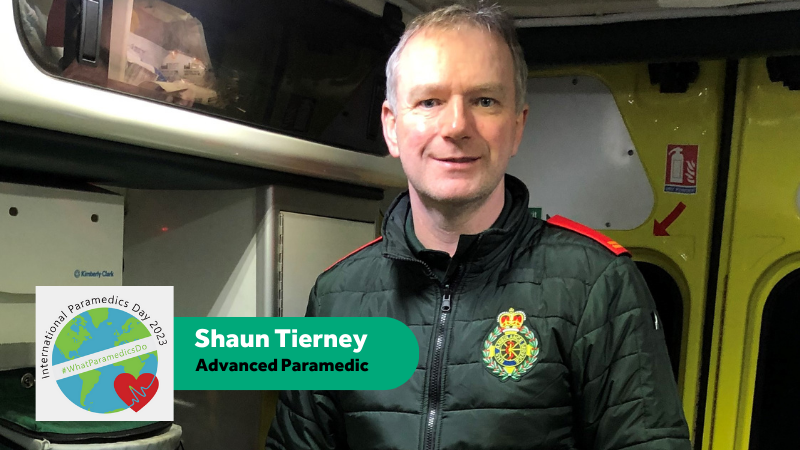
Advanced paramedics can perform certain surgical procedures at the scene of an incident, coordinate and provide clinical advice for complex incidents and are responsible for a team of senior paramedic team leaders.
Shaun is based in Preston and has been a paramedic for 28 years, but it wasn’t his first job within the ambulance service as before that he worked as an ambulance technician as well as in the patient transport service. We spoke to Shan about his role.
Hi Shaun, what attracted you to the paramedic role?
I’d left school and fallen into a job installing scanning systems in supermarkets, which gave me a company car at 19 and travelling around the country staying in nice hotels, but I felt I wanted something that was rewarding. We had an ambulance crew out to my grandma after she’d had a stroke and I thought ‘That looks like an interesting job.’ Thirty-two years later I am here.
What does a day in the life of you and your job role look like?
I know it’s a cliché – but every day is different, and you never know what the next job is going to throw at you. My current role as an advanced paramedic is broadly split into two parts. Firstly, there is the clinically facing role in which I respond on a rapid response car to the more complex incidents such as cardiac arrests, major trauma, maternity cases, patients who require additional drugs not carried on ambulances, or who require interventions not carried out by most paramedics such as thoracostomy – a surgical procedure where we cut into the patient’s chest due to chest trauma or a pneumothorax. I may also work on our complex incident hub in our emergency operations centre – overseeing the allocation of specialist resources to incidents and taking time for critical advice calls to crews remotely. Then the other side of my role is office based, which involves completing any clinical investigations, linking in with the wider health system to support the development of new pathways for patients to reduce emergency department attendance and planning and delivering teaching to name just a handful.
What are your favourite parts of your job?
I suppose it depends on what kind of day I’m having! That said it’s usually when you know you’ve made a difference, no matter how small to improve someone’s life, or even to give someone a good death. The things we do daily and can become accustomed to are significant to patients and their families, they can stay with them forever, and we should recognise that and see the value in it. Also empowering our staff to do their job well and with confidence. Add to that – seeing staff I taught many years ago, now excelling at their job and bringing on the next generation – that gives me great pleasure.
What is the one thing you want people to know about your job that they might not know about?
That we are people just like them underneath this uniform. We feel their frustrations and recognize their needs, but sometimes the frontline NHS cannot fix the problem immediately.
What advice would you give to someone who wants to pursue this as a career?
You need a good sense of humour to survive! In all seriousness, if you do fancy this job – speak to someone who is within the profession, it’s the best way to get a feel for if it’s something you wish to pursue. If you still do after that conversation – go for it!